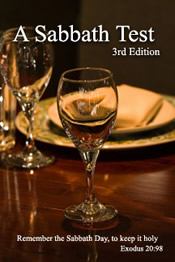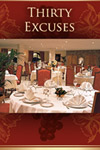


Argument I
A Millennial Foretaste
And your ears shall hear a word behind you, saying,This is the way, walk you in it, when you turn to the right hand,and when you turn to the left.
~Isaiah 30:21~
One of the most popular arguments advanced by those who frequent restaurants on the Sabbath is that such a practice actually enhances the observance of this day. Notice the words of a longstanding evangelist who acknowledged that he and his wife often dine out on the Sabbath, particularly Friday evenings:
“I can’t imagine not going to a fine restaurant on the Sabbath. It’s a very millennial setting - a delicious meal and wonderful fellowship.”
This evangelist offers an interesting point. According to his reasoning, the setting at a fine restaurant makes the Sabbath more reflective of God’s Kingdom. But what would this leader say to those who cannot afford such an activity? Is their Sabbath somehow diminished because they must share this meal in their home? What about going to a pizza parlor or a fast food restaurant on the Sabbath? Would this be consistent with a picture of the millennium?
To be sure, going out to dinner at a fine restaurant is an experience that can bring great pleasure. It is also true that the millennium will be a time of unimaginable abundance and prosperity. But is there a connection between going to a restaurant on the Sabbath and the Kingdom it allegedly pictures? The answer to this question is an emphatic NO! In reality, dining out on the Sabbath not only contradicts God’s Kingdom, it actually embraces the kingdoms of men.
The fact that the meal takes place at an expensive restaurant does not make it any more appropriate than if it were a burger and fries at a local “fast food joint.” Such a practice does not keep this day SACRED or HOLY. It does not show deference to the Sabbath or its purpose. Instead, it is using time that belongs to the Creator of Heaven and Earth for one’s personal enjoyment. Regardless of how adamant this church leader is, this practice does not honor God nor does it picture His kingdom. To illustrate this truth, consider the following question:
Will there be restaurants open on the Sabbath during the millennium?
It is doubtful that any serious Sabbath-keeping Christian would hesitate if asked this question. The answer is: “Of course not!” This being the case, how can an activity that will not be a part of God’s kingdom somehow picture that kingdom? The plain truth is: it can’t!
The mistake in the reasoning of this evangelist is the belief that if something is beautiful and gives pleasure, it must be good. In other words, “it can’t be wrong if it feels so right.”
This same argument has been advanced by the Protestant world in defense of an endless array of traditions it holds dear. After all, Christmas is beautiful and teaches children about the birth of Jesus; it must be good. Easter is beautiful and teaches about His resurrection; it, too, must be good.
The belief that the goodness of something can be determined by the feeling it instills is not new. This line of thinking has been at the center of every heresy ever crafted by men seeking to worship God. Furthermore, it is never the standard God applies when determining righteousness.
The fact of the matter is that the way something looks and feels does not determine its moral standing with the Creator and Sustainer of the Universe. God alone is the True Judge of what is good and what is evil. He is the great Moral Authority. His judgments are reflected in His great moral code: the Ten Commandments. If man truly desires to know what pleases his Creator, he should ask Him. He should seek God’s wisdom in His word. When it comes to buying and selling on His Sabbath, God’s word is very clear. Notice what He conveys through His servant Nehemiah.
And if the people of the land bring ware or any victuals on the Sabbath day to sell, that we would not buy it of them on the Sabbath, or on the holy day... (Neh. 10:31)
Nehemiah’s words are not ambiguous. In fact, they couldn’t be more clear: God’s people are not to purchase goods and services on His Sabbath or holy days.
Later, Nehemiah would become even more forceful when addressing this issue. At that time, he actually locked the gates of Jerusalem and prohibited vendors from entering the city on the Sabbath day to sell their goods. He even threatened to use force to prevent these “entrepreneurs” from engaging in business on the Sabbath.
In those days saw I in Judah some treading wine presses on the Sabbath, and bringing in sheaves, and lading asses; as also wine, grapes, and figs, and all manner of burdens, which they brought into Jerusalem on the Sabbath day: and I testified against them in the Day wherein they sold victuals. There dwelt men of Tyre also therein, which brought fish, and all manner of ware, and sold on the Sabbath unto the children of Judah, and in Jerusalem. Then I contended with the nobles of Judah and said unto them, What evil thing is this that ye do, and profane the Sabbath day? Did not your fathers thus, and did not our God bring all this evil upon us and upon this city? Yet ye bring more wrath upon Israel by profaning the Sabbath. And it came to pass, that when the gates of Jerusalem began to be dark before the Sabbath, I commanded that the gates should be shut, and charged that they should not be opened till after the Sabbath: and some of my servants set I at the gates, that there should no burden be brought in on the Sabbath day. So the merchants and sellers of all kind of ware lodged without Jerusalem once or twice. Then I testified against them, and said unto them, Why lodge ye about the wall? If ye do so again I will lay hands on you. From that time forth they came no more on the Sabbath. (Neh. 13:15-21)
With this in mind, it is hard to imagine that this great servant of God would see the practice of going to a restaurant on the Sabbath as a picture of God’s millennial Kingdom. On the contrary, Nehemiah saw it as a threat to God’s people. In a very real sense, this champion of faith saw buying and selling on the Sabbath as a picture of something very ominous – CAPTIVITY! Notice his words:
Did not your fathers thus (buy and sell on the Sabbath), and did not our God bring all this evil (captivity) upon us, and upon this city? Yet you bring more wrath upon Israel by profaning the Sabbath. (Ne. 13:18)
Here, Nehemiah is declaring that the people of Judah were engaging in the very practice that led to their captivity in the first place. They were profaning God’s Sabbath. They desecrated this holy time by engaging in business. They were purchasing food on this sacred day.
Sabbath Conversation and Restaurants
Some have argued that going to a restaurant on the Sabbath is acceptable to God because of what is done there. After all, God’s people go there to talk about the Bible and the Kingdom. How could that not please Him?
Once again, this argument employs the same reasoning used by the Protestant world when they justify keeping Sunday as their Sabbath. After all, every Sunday they read the Bible, sing praises to God, and pray for His kingdom to return. That must be pleasing to Him, too, right? What Sabbath-keeping Christian really believes this argument?
Throughout human history, man has always attempted to justify his behavior by cloaking it in acts of goodness. However, when you get right down to it, talking about God while dining out on the Sabbath possesses about the same moral weight as talking about God while eating a ham sandwich. The problem is not with the conversation. It’s with the conduct.
Come Out of Her, My People
One of the great ironies of going to a restaurant on the Sabbath is that this practice actually mirrors one of the most popular traditions of this world. In the United States, more people frequent restaurants between Friday evening and Saturday evening than any other 24-hour period. There is even a major restaurant chain whose name captures the sentiments of this tradition—“Thank God it’s Friday.”
Regardless of how hard one may defend the tradition of dining out on the Sabbath, it simply doesn’t reconcile with the scriptures. The plain truth is clear and direct. Dining out on the Sabbath is not Godly; it is WORLDLY! It is a tradition of men – one that is embraced by a world that couldn’t care less about the Great God of Heaven and His soon coming Kingdom. It is hard to imagine a practice that stands in greater defiance to the Creator and His law.
Tragically, thousands of God’s people see this practice as harmless. But make no mistake about it: God did not invent going to restaurants on His Sabbath. It is a tradition of a world that doesn’t know Him. God warns His people to beware of being ensnared by the practices of a society that is defiant to Him. Here is what He says.
And I heard another voice from heaven, saying, Come out of her, my people, that ye be not partakers of her sins, and that ye receive not of her plagues. (Rev. 18:4)
Those who think that going to a restaurant on the Sabbath is an appropriate activity because it creates a millennial setting should think again. When that millennial Kingdom returns, God’s Sabbath and holy days will be honored in accordance with His instructions, not man’s traditions.

